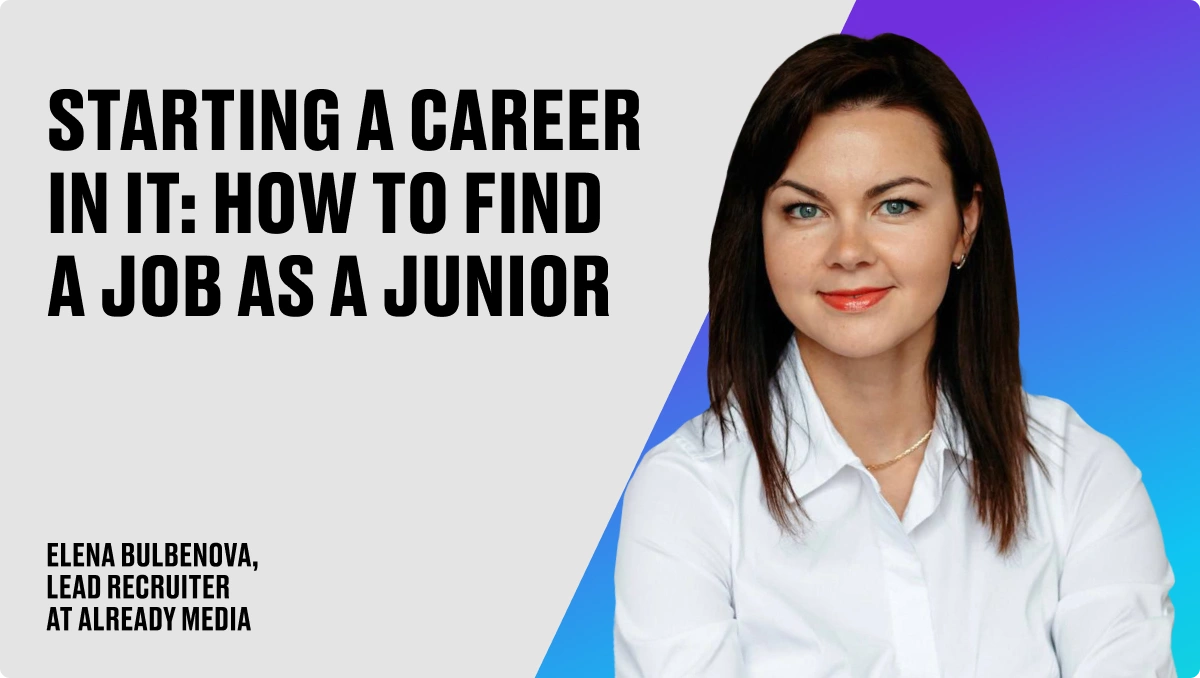
In this exclusive interview with Elena Bulbenova, Team Leader of Recruitment at Already Media, we dive deep into the essential strategies juniors need to break into the IT industry. If you’re a beginner looking to start your career in IT, this article is for you.
We discuss everything you need to know—how to craft an impressive CV, write a persuasive cover letter, where to find job opportunities, and how to ace your communication with recruiters to land that crucial first offer. Ready to unlock these insider tips? Read on to discover how to kickstart your IT career.
How to Craft a CV for a Junior Specialist
Key elements for a beginner IT specialist’s CV
For beginners, it’s crucial to focus on a few key aspects: include your contact details, such as email and Telegram, a current photo, location, and basic information like age and gender. Even a small amount of experience, such as internships or volunteer work, should be listed. Don’t forget to mention your education—both primary and any additional courses if applicable. Include your actual language skills and, if desired, briefly outline your goals and interests. This helps recruiters understand what tasks and roles you are interested in.
How to highlight skills when you don’t have work experience
When you lack experience, focus on your strengths and how you can bring value. Think about what you’re genuinely good at and what skills you possess, even if they are not directly related to the job. Mention any achievements during your studies or other activities to show your willingness to grow and work in the field. Be concise—five to ten sentences highlighting your key strengths or accomplishments are sufficient.
Common mistakes juniors make when writing a CV
One common mistake is forgetting to include even minimal work experience or practice. Even if your experience is limited, it’s important to show that you are actively developing and understand which area you want to work in. Additionally, avoid overstating your skills or including information you don’t fully understand. Exaggerations can backfire during the interview and damage your reputation. Honesty and accuracy are highly valued.
Should you include projects from your studies in your CV?
Yes, you should. If you don’t have commercial experience, projects completed during your studies can play a key role. Mention what you did, which tools you used, and what you accomplished. This shows your activity and desire to learn.
How to correctly list education in a CV?
In the education section, only include higher or vocational education—there’s no need to list your high school. If you have taken additional courses or participated in events, include them, but only the most significant ones. This gives recruiters an idea of your professional development and interests.
How to Write a Cover Letter
How to write a cover letter that grabs an employer’s attention
In a cover letter, it’s important to be brief and specific. Mention that you’ve reviewed the job posting and what attracted you to the position. If possible, show how your skills match the job requirements and why you are interested in the company. For your cover letter to stand out, it should be concise and focused.
Common mistakes to avoid in a cover letter for juniors
Avoid using generic phrases or overloading the letter with unnecessary details. Your information should be concise and attention-grabbing. Recruiters spend less than a minute skimming through resumes, so it’s crucial to catch their attention with relevant content. For instance, avoid starting with “I am interested in your vacancy” or “Please consider my resume.” Similarly, don’t delve into personal problems or difficulties that could distract from your qualifications. Focus on how your skills match the job requirements and what specifically attracted you to this company. For example:
Instead of:
“I want to work at your company because of its success.”
Write:
“I’m impressed by your approach to [mention a specific practice], and I believe my skills in [highlight a key skill] would integrate well with your team. My experience in [mention specific achievements or skills] has helped me develop abilities that will contribute to successfully completing tasks in this role.”
This approach helps you stand out and demonstrates your focus and understanding of the company.
Should you customize your cover letter for each job?
Yes, it’s recommended to customize your cover letter for each job. This shows recruiters that you are genuinely interested in the position and understand how your skills can benefit the company.
Which personal qualities should you mention in your cover letter?
It’s better to mention personal qualities in your resume. In the cover letter, focus on why you are suitable for the position and what attracts you to the company. If you want to highlight certain personal qualities, provide a clear example of how this quality will help you succeed in the role.
What information from your CV should be repeated in the cover letter?
Avoid repeating information from your CV in the cover letter. Your cover letter should complement the resume, not copy it. Use the letter to grab the recruiter’s attention and demonstrate why you are a good fit for the job.
Job Search Resources for Juniors
Best websites and platforms for beginner IT specialists to find jobs
If you’re just starting your IT career, it’s essential to know where to look for opportunities. I’d recommend several platforms. Local and international job boards, such as Djinni, Indeed, and Glassdoor, offer a wide selection of vacancies and user-friendly interfaces.
According to a Jobvite study, 77% of employers use LinkedIn to find candidates, and millions of people secure jobs through this platform daily. Based on Already Media’s statistics, about 30% of our specialists are found through LinkedIn, around 25% via job boards, approximately 22% come through employee referrals, 18% from Telegram channels, and 5% from other sources.
LinkedIn is a treasure trove for job searches and networking. Specialized Telegram channels are also useful, often featuring vacancies not listed on major platforms. Subscribe to our Telegram channel, where we regularly share job openings and new opportunities. This could be your first step toward landing your dream job!
How to use social media for IT job searches
LinkedIn is a must-have. Create an updated profile, participate in discussions, and join relevant groups. Connect with HR professionals and recruiters from companies that interest you, as well as those in related industries—this boosts your profile in searches. Writing thoughtful posts and sharing news and trends helps attract employers and establish professional connections in your field.
Should you attend job fairs and professional conferences?
Absolutely, attending professional events and conferences is a great idea! These events offer excellent opportunities for networking, making valuable connections, and meeting potential employers. For instance, our team regularly attends events like Sempro, Affhub (UA market), IGB Live, and Sigma (European market). This helps us stay updated on the latest trends and expand our network. Prepare for these events by reviewing the list of participants and delegates, and check if any companies have open positions that interest you. This approach allows you to make the most of your time and better understand which companies and professionals could be valuable contacts for you. Remember, each meeting could lead to a new opportunity!
How to Communicate with Recruiters
How to prepare for your first contact with a recruiter
Preparation is key to a successful job search. Start by thoroughly reviewing the job description and researching the company. This helps you understand what the employer is looking for and how you meet those requirements. Prepare questions in advance to ask the recruiter, demonstrating your interest and readiness. Don’t forget to check your tech setup—ensure your camera, microphone, and internet connection are working properly.
A professional appearance and a good connection are also important. Create a comfortable and professional environment for the interview. But most importantly, relax and stay calm. Stress often prevents people from showcasing their best qualities during the first interview. Be confident, focus on your strengths, and answer questions honestly—even if you lack experience. This approach significantly increases your chances of a successful interview.
How to handle uncomfortable questions from a recruiter
Uncomfortable questions during an interview can sometimes be a test of your resilience. In these situations, stay calm and answer honestly. If a question makes you uncomfortable, don’t panic—take a moment to think. Every difficult question is an opportunity to show how you handle unexpected challenges. Provide examples from your experience if appropriate. This demonstrates your problem-solving skills and your approach to handling challenges. Preparing for tough questions in advance helps avoid confusion and shows confidence. For example, if asked about weaknesses or failures, focus on how you overcame difficulties and what you learned from them. This approach shows your ability to self-reflect and grow.
Conclusion
Starting a career in IT can be both exciting and challenging for junior specialists. Crafting a strong CV, writing a concise and impactful cover letter, and effectively utilizing job platforms and networking opportunities are all essential steps in landing that first role. By focusing on your skills, projects, and dedication to continuous learning, even without commercial experience, you can stand out to recruiters. Additionally, maintaining a professional presence on LinkedIn, attending career fairs, and preparing for interviews with confidence will enhance your chances of success.
Ready to take the next step in your IT career? Explore exciting opportunities at Already Media by visiting our career page.

